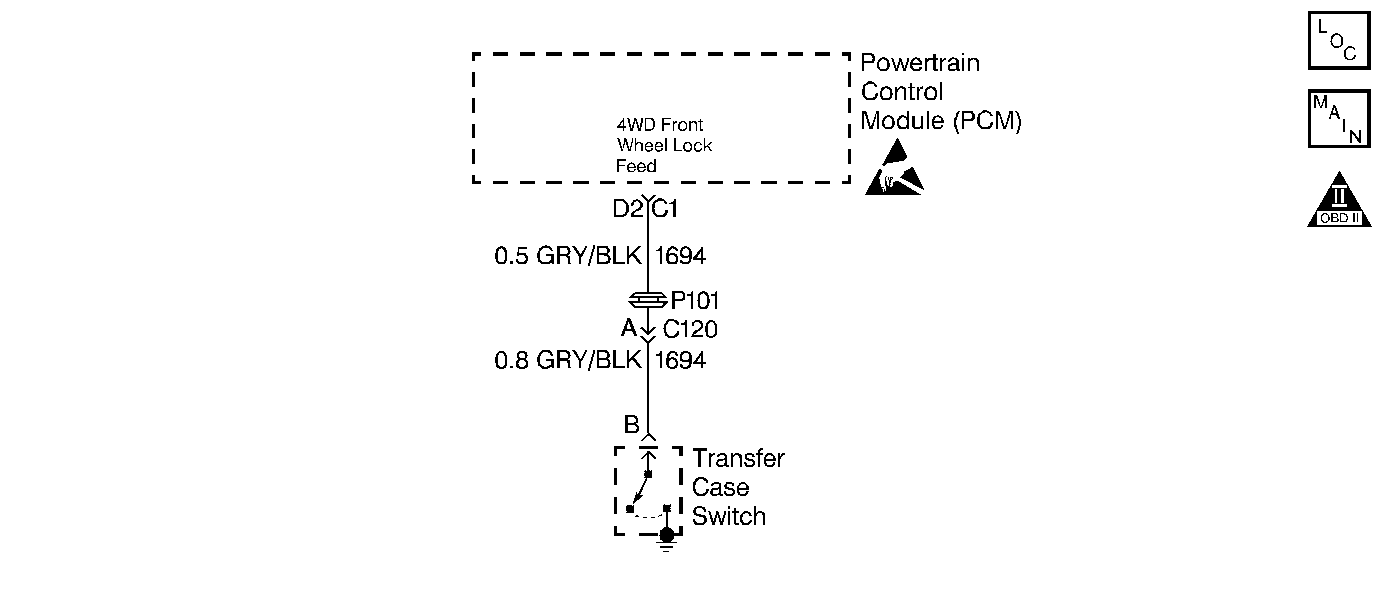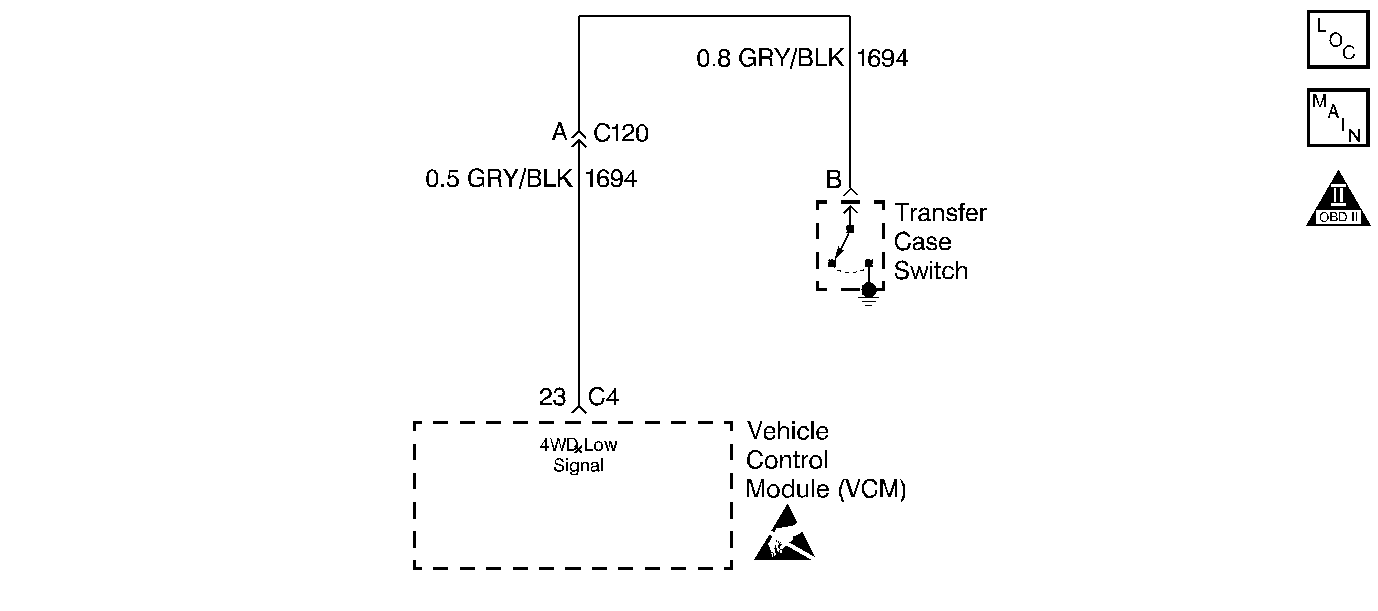DTC P1875 4 Wheel Drive Switch Circuit 6.5L Diesel

Circuit Description
When 4WD low engages, the input signal on circuit 1694 to the Powertrain Control Module (PCM) changes from ignition voltage to zero. The 4WD low switch signal corrects the transmission output speed signal to the PCM. This signal compensates for transfer case gear reduction. The PCM uses the transmission output speed signal in order to adjust shift points, line pressure, and Torque Converter Clutch (TCC) scheduling.
If the PCM detects a continuous open or short to ground in the 4WD low circuit , then DTC P1875 sets. DTC P1875 is a type A DTC.
Conditions for Setting the DTC
| • | No OSS Sensor DTCs P0722 or P0723. |
| • | No TCC PWM Sol. Valve DTC P0742. |
| • | No 1-2 SS Valve DTCs P0753 or P0751. |
| • | No 2-3 SS Valve DTCs P0758 or P0756. |
| • | No TFP Val. Position Sw. DTC P1810. |
| • | No TCC PWM Sol. Valve DTC P1860. |
| • | The gear range is D4. |
| • | The APP Angle is 9-99%. |
| • | The engine is running greater than 475 RPM for more than 7 seconds. |
| • | The TFT is 0-130°C (32-248°F). |
| • | The shift solenoid performance fail counters are zero. |
| • | All of the above conditions are met and one of the following fail conditions are true: |
| - | Four wheel drive low circuit is closed (grounded) for greater than 3 seconds in any one gear, and the transfer case ratio is 0.95-1.05:1 for 2 occurrences. |
| - | Four wheel drive low circuit is open for 1.5 seconds in two different commanded gears, and the transfer case ratio is 2.65-2.75:1 for the first occurrence. |
Action Taken When the DTC Sets
| • | The PCM freezes shift adapts from being updated. |
| • | When stuck ON, the PCM assumes a non 4WD low state for a transmission shift pattern. |
| • | When stuck OFF, the PCM assumes a 4WD low state for a transmission shift pattern. |
| • | The PCM illuminates the Malfunction Indicator Lamp (MIL). |
Conditions for Clearing the MIL/DTC
- The PCM turns OFF the MIL after three consecutive ignition cycles without a failure reported.
- A scan tool can clear the DTC from the PCM history. The PCM clears the DTC from the PCM history if the vehicle completes 40 warm-up cycles without a failure reported.
- The PCM cancels the DTC default actions when the fault no longer exists and the ignition is OFF long enough in order to power down the PCM.
Diagnostic Aids
| • | Inspect the wiring for poor electrical connections at the PCM. Inspect the wiring for poor electrical connections at the transmission 20-way connector. Look for the following problems: |
| - | A bent terminal |
| - | A backed out terminal |
| - | A damaged terminal |
| - | Poor terminal tension |
| - | A chafed wire |
| - | A broken wire inside the insulation |
| • | When diagnosing for an intermittent short or open, massage the wiring harness while watching the test equipment for a change. |
Test Description
The numbers below refer to the step numbers on the diagnostic table.
-
This step tests for a short to ground in circuit 1694.
-
This step tests for an open in circuit 1694 or a faulty transfer case switch.
Step | Action | Value(s) | Yes | No | ||||
|---|---|---|---|---|---|---|---|---|
1 | Was the Powertrain On-Board Diagnostic (OBD) System Check performed? | -- | ||||||
2 |
Important: Before clearing the DTCs, use the scan tool in order to record the Freeze Frame and Failure Records for reference. The Clear Info function will erase the data. Does the 4WD Low on the scan tool display Disabled when 4WD HI is selected and Enabled when 4WD-LOW is selected? | -- | Go to Diagnostic Aids | |||||
Does the 4WD Low on the scan tool indicate Enabled? | -- | |||||||
Does 4WD Low indicate Enabled when circuit 1694 is grounded? | -- | |||||||
5 | Replace the transfer case switch. Refer to Transfer Case Switch Replacement. Is the replacement complete? | -- | -- | |||||
6 |
Refer to Electrical Diagnosis, Section 8. Did you find a problem? | -- | ||||||
7 |
Refer to Electrical Diagnosis, Section 8. Did you find a problem? | -- | ||||||
8 | Replace the PCM. Refer to Powertrain Control Module Replacement/Programming , Section 6. Is the replacement complete? | -- | -- | |||||
9 | In order to verify your repair, perform the following procedure:
Has the test run and passed? Important: After the repair has been made, a harsh shift condition may exist. This condition is caused by the steady state adapts. To clear the steady state adapt cells, remove battery power from the PCM for 60 seconds. Then reconnect the battery and drive the vehicle. If the condition still exists, refer to Symptom Based Diagnosis, in this Section. | -- | System OK |
DTC P1875 4 Wheel Drive Switch Circuit 5.7L and 7.4L Gas

Circuit Description
The 4WD low circuit consists of a 4WD indicator assembly, a selector quadrant switch, and wiring. When the operator moves the selector quadrant switch to 4 Low, the 4WD indicator lamp illuminates, and circuit 1694 voltage to the Vehicle Control Module (VCM) changes from B+ to zero. The 4WD low switch signal is used to correct the transmission output speed signal to the VCM. This signal compensates for transfer case gear reduction. The VCM uses the transmission output speed signal in order to adjust shift points, line pressure, and TCC scheduling.
If the VCM detects a continuous open or short to ground in the 4WD low circuit, then DTC P1875 sets. DTC P1875 is a type D DTC. For California emissions vehicles DTC P1875 is a type B DTC.
Conditions for Setting the DTC
| • | No TP Sensor DTCs P0121, P0122 or P0123. |
| • | No OSS DTC P0502. |
| • | No 1-2 SS Valve DTC P0753. |
| • | No 2-3 SS Valve DTC P0758. |
| • | No TFP Val. Position Sw. DTC P1810. |
| • | The engine is running at least 475 RPM for 7 seconds. |
| • | The TFP Val. Position Sw. is D4. |
| • | The TP Sensor is 10-100%. |
| • | The TFT is 20-125°C (68-248°F). |
| • | The shift solenoid performance counters are zero. |
| • | All of the above conditions are met and one of the following fail conditions are true: |
| - | Four wheel drive low circuit is closed (grounded) for more than 2 seconds with a transfer case ratio of 0.95-1.05:1. |
| - | The four wheel drive low circuit is open for 3 seconds with a transfer case ratio of 2.66-2.76:1 in any two gears for 1 occurrence. |
Action Taken When the DTC Sets
| • | The VCM assumes a 4WD Low state for transmission shift patterns when stuck OFF. |
| • | The VCM assumes a non 4WD Low state for transmission shift patterns, when stuck ON. |
| • | The VCM freezes shift adapts from being updated. |
| • | For California emissions vehicles, the VCM illuminates the Malfunction Indicator Lamp (MIL). |
Conditions for Clearing the DTC
- For California emissions vehicles, the VCM turns OFF the MIL after three consecutive ignition cycles without a failure reported.
- A scan tool can clear the DTC from the VCM history. The VCM clears the DTC from the VCM history if the vehicle completes 40 warm-up cycles without a failure reported.
- The VCM cancels the DTC default actions when the fault no longer exists and the ignition is OFF long enough in order to power down the VCM.
Diagnostic Aids
| • | Inspect the wiring for poor electrical connections at the VCM. Inspect the wiring for poor electrical connections at the transmission 20-way connector. Look for the following problems: |
| - | A bent terminal |
| - | A backed out terminal |
| - | A damaged terminal |
| - | Poor terminal tension |
| - | A chafed wire |
| - | A broken wire inside the insulation |
| • | When diagnosing for an intermittent short or open, massage the wiring harness while watching the test equipment for a change. |
| • | First diagnose and clear any engine DTCs or TP Sensor codes that are present. Then inspect for any transmission DTCs that may have reset. |
| • | Low pump pressure and a slipping trans can cause DTC P1875 to set. |
Test Description
The numbers below refer to the step numbers on the diagnostic table.
-
This step tests for a short to ground in circuit 1694.
-
This step tests for an open in circuit 1694 or a faulty transfer case switch.
Step | Action | Value(s) | Yes | No | ||||
|---|---|---|---|---|---|---|---|---|
1 | Was the Powertrain On-Board Diagnostic (OBD) System Check performed? | -- | ||||||
2 |
Important: Before clearing the DTCs, use the scan tool in order to record the Freeze Frame and Failure Records for reference. The Clear Info function will erase the data. Does the 4WD Low on the scan tool display Disabled when 4WD HI is selected, then Enabled when 4WD Low is selected? | -- | Go to Diagnostic Aids | |||||
Does the 4WD Low on the scan tool indicate Enabled? | -- | |||||||
Does 4WD Low indicate Enabled when circuit 1694 is grounded? | -- | |||||||
5 | Replace the transfer case switch. Refer to Transfer Case Switch Replacement. Is the replacement complete? | -- | -- | |||||
6 |
Refer to Electrical Diagnosis, Section 8. Did you find a problem? | -- | ||||||
7 |
Refer to Electrical Diagnosis, Section 8. Did you find a problem? | -- | ||||||
8 | Replace the VCM. Refer to VCM Replacement/Programming , Section 6. Is the replacement complete? | -- | -- | |||||
9 | In order to verify your repair, perform the following procedure:
Has the test run and passed? | -- | System OK |
